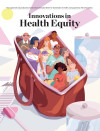When people hear about Stockton, Calif., in the news, they usually hear about crime, bankruptcy, and foreclosures. Not surprisingly, many assume that this city in San Joaquin County is a place with no opportunities, no hope, and no love—and the data don’t discourage that point of view. In 2012, Stockton had a crime rate of 857.6 per 100,000 people, more than four times the national average. Young people ages 10 to 24 in the county suffer a murder rate of 21.29 per 100,000 people, nearly three times California’s overall rate. Graduation rates are low and incarceration rates are high. According to US Census data, more than 20 percent of Stockton’s population is living below the poverty line. Moreover, according to the US Department of Housing and Urban Development, Stockton ranks among the four metropolitan areas nationwide highest in homelessness.
Innovations in Health Equity

This special supplement examines the organizations and programs that are addressing social inequalities in housing, transportation, work, and other parts of society that create disparate health outcomes.
-
Innovations in Health Equity and Health Philanthropy
-
Illuminating the Health Equity Challenge
-
Partnering with Philanthropy in Native America
-
Building Power, Building Health
-
Philanthropy on the Frontlines of Ferguson
-
Promoting Health Impact Assessments
-
Building a Healthier Nail Salon Industry
-
Embracing Healing Justice in California
-
Ending LGBT Health Inequities
-
Achieving Healthy Communities Through Transit Equity
-
Using Fair Housing to Achieve Health Equity
-
Reducing Health Disparities in Atlanta
It’s true that Stockton is up against incredibly difficult challenges. Yet the city is also full of resilience, strength, and heart. We see these qualities at Fathers and Families of San Joaquin (FFSJ) every day. FFSJ works to build healthy communities by supporting the social, cultural, emotional, and economic renewal of the most vulnerable families in Stockton and the San Joaquin Valley. But our work goes far beyond delivering services. We are committed to individual and community transformation and creating change through healing-centered organizing—an emerging practice that places individual and collective emotional and spiritual well-being at the center of social justice efforts. We are striving to transform Stockton through culturally rooted, healing-centered practices and a pedagogy of love. We believe that if others commit to this same approach, the city will turn around.
Putting Healing and Justice at the Center
Healing-centered organizing is based on four core principles: healing responds to the needs of the community; healing is political; healing and organizing intersect; and healing is found in culture and spirituality.
One way we’re incorporating healing-centered organizing is by serving as a lead partner for the San Joaquin County Alliance for Boys and Men of Color, one of 15 alliances throughout California composed of organizations trying to improve the lives of boys and men of color. This coalition fosters dialogue between youth and adults and engages law enforcement, philanthropy, local government, and other sectors of society to develop strategies to support boys and men of color. The alliance primarily involves young men of color, but FFSJ also engages a wide range of ages, ethnicities, and genders in healing justice work. The alliance is also connected to larger national efforts to expand opportunities and reduce disparities for boys and men of color.
Another way we support healing-centered organizing is through research and community engagement. FFSJ partners with the Center for Regional Change at the University of California, Davis, to teach community residents about participatory action research, the politics of data, and how to analyze social inequities. We also support youth organizers working to dismantle the alarming school-to-prison pipeline in Stockton by challenging policies and practices that contribute to the criminalization of youth and overwhelmingly affect young people of color.
We also provide Stockton residents with safe spaces where they can share experiences experiences and heal from trauma they have suffered. Such healing circles are steeped in the values of La Cultura Cura (Culture Heals), a practice of reconnecting to cultural teachings and restorative practices to tap resilience and build well-being.
Sustaining and Supporting Healing
Despite its importance in social change, healing is often unacknowledged and unfunded. We encourage philanthropists to consider the long-term and holistic benefits of providing resources to support community organizations dedicated to healing-centered organizing. We also encourage funders to follow these three recommendations, each of which will help the people who live in marginalized communities strengthen their neighborhoods and create new opportunities for themselves and the generations that follow:
- Listen to youth leaders and community organization staff; their front-line vantage point will yield valuable insights. The top-down approach has been largely ineffective. To create transformative change, we must engage the people who are most affected.
- Establish an innovation fund that supports healing, arts, and culturally based approaches to improve outcomes for boys and young men of color. Such a fund could support implementation and evaluation of healing justice practices.
- Provide more flexible grants—including general operating costs, multi-year grants, and delayed expectation of immediate outcomes—based on trusting relationships and agreement on shared outcomes. Doing so would support grassroots efforts to build infrastructure and capacity, develop local leadership, respond to emerging community needs, and support those working closest to the ground.
Support SSIR’s coverage of cross-sector solutions to global challenges.
Help us further the reach of innovative ideas. Donate today.
Read more stories by Samuel Nuñez, Alejandra Gutierrez & Emily Borg.

